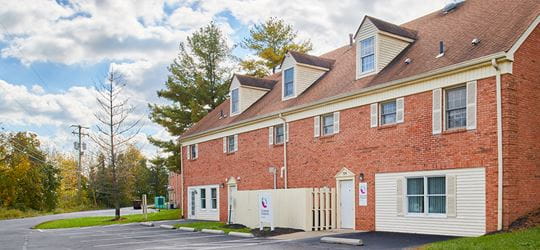William R. DeFoor Jr., MD, MPH
- Urologist, Division of Urology
- Director, Clinical Research
- Professor, UC Department of Surgery
- urology@cchmc.org
- 513-636-4975
- Board Certified
About
Biography
As a pediatric urologist at Cincinnati Children’s, I treat all conditions pertaining to the urinary tract in children. As co-director of the Pediatric Stone Center, I focus heavily on the surgical and medical management of children with kidney stones, a condition that is becoming much more common in the United States. I also treat tumors of the urinary tract and birth defects of the genitalia including hypospadias and undescended testicles. I perform robotic-assisted laparoscopic surgery on kidneys. Along with my partners, I see and treat patients from all over the world who have complex bladder abnormalities requiring surgical reconstruction.
When I entered medical school back in 1992, I was initially attracted to primary care and wanted to go back to my small town in Kentucky and be a family doctor. However, after my surgery rotations, I found a different calling. Urology as a specialty is a good mix of medical treatment and surgical procedures and presents different challenges every day. When I was exposed to pediatric urology as a resident, I found my true passion.
Pediatric urology allows me not only to correct urgent problems, such as hernias and kidney stones, but also to manage patients with chronic diseases of the urinary tract that need ongoing, lifelong care. Following these patients from birth is extremely rewarding. It’s amazing to watch children grow up under your care and see them blossom into young adults.
Every patient and family should be treated as individuals with a treatment plan specific to their needs. All factors – medical, behavioral and social – need to be carefully considered. Even though two patients can have nearly identical conditions, based on the whole picture, they may need a different plan of care. A surgeon can perform a technically successful operation, but if it doesn’t meet the patient’s needs and expectations, there may still be an unsatisfactory outcome.
My main goal with every patient encounter is to ensure that the voice of the patient and family is heard. I take my time to listen to what brought the family to me. I review all available test results, including X-ray images, with the family in the office. At the end of the visit, I address all of their questions and concerns. If needed, I will arrange a follow-up phone or in-person consultation after the appointment to further discuss complex issues. This gives them a chance to consider the options and do their own research. I do this to make sure our course of action is comfortable for the patient, family and surgical team.
I was honored to have been awarded an endowed chair in Clinical Outcomes Research at Cincinnati Children’s Hospital in 2018. I was also named Educator of the Year in the Division of Urology at the University of Cincinnati College of Medicine the same year. I serve on multiple national and international executive boards. These have included the American Academy of Pediatrics Section on Urology Executive Committee and the Pediatric Urology Fellowship Directors Committee, of which I was vice chair and am now chair-elect. I’m also past president and education chair of the American Association of Pediatric Urologists, a national organization of specialists in our field.
In addition to clinical care, I conduct research to study diseases of the urinary tract and determine optimum treatments for our patients. In pediatric urology, we often deal with rare conditions for which there are few randomized clinical trials. These trials are considered the highest level of evidence in medical research and are critical to determining the best course of action.
Recently, Cincinnati Children’s participated in the largest trial of children with vesicoureteral reflux (RIVUR study), and the findings were published in the New England Journal of Medicine. Due to the large volume of complex and rare conditions we see at Cincinnati Children’s, we are in a unique position to add our experience and knowledge to the world’s medical research literature.
In my spare time, I love to run half marathons and coach recreational league youth basketball. As a graduate of the University of Kentucky Medical School, I’m a huge college basketball fan, of course. I was recently elected to be an elder at my church, and I’m an avid reader of both fiction and nonfiction. My wife, a general pediatrician, and I have three teenagers as well as a 120-pound Great Dane, which leads to lots of fun and chaos at our house!
BS: Georgia Institute of Technology, Atlanta, GA, 1991.
Fulbright Fellowship: Universite' Rene' Descartes, Paris, France, 1992.
MD: University of Kentucky, Lexington, KY, 1996.
Residency: Medical University of South Carolina, Charleston, SC, 2001.
Fellowship: Cincinnati Children's Hospital, Cincinnati, OH, 2003.
MPH: Harvard University, Boston, Massachusetts, School of Public Health, 2005.
Interests
Complex genitourinary reconstruction; clinical outcomes research; clinical trials; urolithiasis; uro-oncology; laparoscopic-assisted; robotic-assisted surgery; vesicoureteral reflux
Interests
Modulation of apoptosis in cryptorchidism (undescended testes) with anti-oxidant pharmacotherapy; pediatric urologic surgical outcomes analysis using an evidence based medicine approach
Locations (3)
Insurance Information
Cincinnati Children's strives to accept a wide variety of health plans. Please contact your health insurance carrier to verify coverage for your specific benefit plan.
Publications
Ureteroscopy vs Shockwave Lithotripsy to Remove Kidney Stones in Children and Adolescents: A Nonrandomized Clinical Trial. JAMA Network Open. 2025; 8:e2525789.
Predictive Factors for Ureteral Stone Passage in Children. Journal of Endourology and Part B, Videourology. 2025; 39:748-754.
Percutaneous Nephrolithotomy vs Ureteroscopy for Kidney Stones in Children. JAMA Network Open. 2025; 8:e2516749.
Alkaline urine is associated with increased risk of calcium phosphate nephrolithiasis in medically complex children receiving enteral nutrition. Journal of Pediatric Urology. 2025; 21:591-597.
IP09-05 PREVALENCE OF CLOSTRIDIUM DIFFICILE INFECTION FOLLOWING LOWER URINARY TRACT RECONSTRUCTION. Investigative Urology. 2025; 213:e456.
Time to therapy and safety of testicular tissue cryopreservation in children undergoing gonadotoxic treatment or hematopoietic stem cell transplant. Journal of Pediatric Urology. 2024; 20:747.e1-747.e7.
One and done: Feasibility and Safety of Primary Ureteroscopy in a Pediatric Population. Journal of Pediatric Urology. 2024; 20:224.e1-224.e7.
Distinguishing characteristics of pediatric patients with primary hyperoxaluria type 1 in PEDSnet. Journal of Pediatric Urology. 2024; 20:88.e1-88.e9.
Reoperative Anorectal Procedures in Patients with Anorectal Malformations - Is Bladder Function Affected?. Journal of Pediatric Surgery. 2023; 58:1910-1915.
The real world experience of pediatric primary hyperoxaluria patients in the PEDSnet clinical research network. European Journal of Pediatrics. 2023; 182:4027-4036.
From the Blog
Podcast | Bedwetting: Practical Advice for Families
William Robert DeFoor Jr., MD, MPH2/2/2024









Patient Ratings and Comments
All patient satisfaction ratings and comments are submitted by actual patients and verified by a leading independent experience management company, Qualtrics. Patient identities are withheld to ensure confidentiality and privacy. Only those providers whose satisfaction surveys are administered through Cincinnati Children’s Hospital Medical Center are displayed. Click here to learn more about our survey